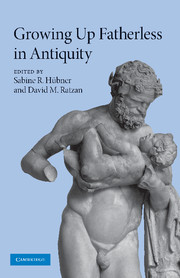Book contents
- Frontmatter
- Contents
- List of figures
- List of tables
- List of contributors
- Acknowledgments
- Note on abbreviations
- INTRODUCTION
- 1 Fatherless antiquity? Perspectives on “fatherlessness” in the ancient Mediterranean
- PART I COPING WITH DEMOGRAPHIC REALITIES
- PART II VIRTUAL FATHERLESSNESS
- PART III ROLES WITHOUT MODELS
- PART IV RHETORIC OF LOSS
- 11 The disadvantages and advantages of being fatherless: the case of Sulla
- 12 An imperial family man: Augustus as surrogate father to Marcus Antonius' children
- 13 Cui parens non erat maximus quisque et vetustissimus pro parente: paternal surrogates in imperial Roman literature
- 14 The education of orphans: a reassessment of the evidence of Libanius
- 15 “Woe to those making widows their prey and robbing the fatherless”: Christian ideals and the obligations of stepfathers in late antiquity
- Bibliography
- Index
11 - The disadvantages and advantages of being fatherless: the case of Sulla
Published online by Cambridge University Press: 30 July 2009
- Frontmatter
- Contents
- List of figures
- List of tables
- List of contributors
- Acknowledgments
- Note on abbreviations
- INTRODUCTION
- 1 Fatherless antiquity? Perspectives on “fatherlessness” in the ancient Mediterranean
- PART I COPING WITH DEMOGRAPHIC REALITIES
- PART II VIRTUAL FATHERLESSNESS
- PART III ROLES WITHOUT MODELS
- PART IV RHETORIC OF LOSS
- 11 The disadvantages and advantages of being fatherless: the case of Sulla
- 12 An imperial family man: Augustus as surrogate father to Marcus Antonius' children
- 13 Cui parens non erat maximus quisque et vetustissimus pro parente: paternal surrogates in imperial Roman literature
- 14 The education of orphans: a reassessment of the evidence of Libanius
- 15 “Woe to those making widows their prey and robbing the fatherless”: Christian ideals and the obligations of stepfathers in late antiquity
- Bibliography
- Index
Summary
This chapter explores fatherlessness in the political self-fashioning of the late Roman Republic. Specifically, it will examine the political and ideological disadvantages and advantages of being fatherless through a discussion of Lucius Cornelius Sulla's strategic use of fatherlessness as a part of his rhetoric of power. As this chapter will show, Sulla successfully forged a public image of himself as a divinely chosen statesman who surpassed all other men on the basis of his personal virtue and special relationship to the gods. In this he borrowed from Hellenistic and Eastern models of kingship that projected an image of the ruler as a self-made man, and as such did not owe his position of power to family connections or ancestral deities. These models led Sulla to all but disown his family and advertise himself as a “fatherless” politician in a culture that revered both personal and political “fathers.” Sulla's persona thus provides us with a special view into the role of the father and of growing up fatherless in the political culture of antiquity.
SULLA: BEING FATHERLESS IN THE COMMENTARII
At the end of his life Sulla wrote his memoirs. According to Plutarch, he abandoned his work on the last book in 78 bce, just two days before he died. After he laid down the dictatorship, Sulla was nominally a privatus and it was during this time that he wrote his memoirs in his country home near Puteoli. This was, of course, a mere illusion.
- Type
- Chapter
- Information
- Growing Up Fatherless in Antiquity , pp. 195 - 216Publisher: Cambridge University PressPrint publication year: 2009
- 1
- Cited by



